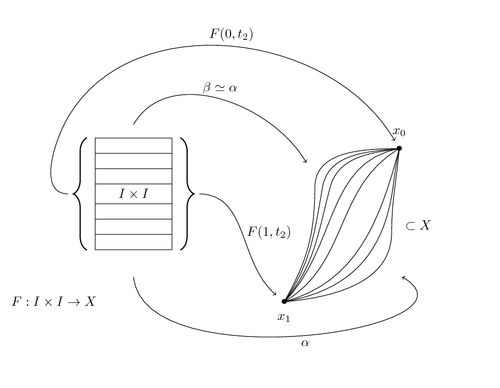http://texblog.net/latex-archive/maths/jpgfdraw-example/ rewritten in TikZ
Following an illustration in Singer/Thorpe: Lecture Notes in Elementary Topology and Geometry, the example has been drawn by Stefan Kottwitz using jpgfdraw, and programmed by Alain Matthes on http://tex.stackexchange.com/q/1238/ .

Edit and compile if you like:
% Homotopy of paths
% Author: Alain Matthes
\documentclass[a4paper,10pt]{article}
\usepackage{tikz}
\usepackage[active,tightpage]{preview}
\PreviewEnvironment{tikzpicture}
\setlength\PreviewBorder{5pt}%
\usetikzlibrary{arrows,calc,shapes,decorations.pathreplacing}
\begin{document}
\begin{tikzpicture}
\node at (0,0) {$F : I \times I \rightarrow X$};
\node[label=below:$x_1$] (x1) at (6,0) {$\bullet$};
\node[label=above:$x_0$] (x0) at (9,4) {$\bullet$};
\node at (9.5,2) {$\subset X$};
\draw (x1.center) to [out=5,in=-90]++(2.8,1.8) to[out=90,in=-95](x0.center);
\draw (x1.center) to [out=10,in=-110]++(2.6,2) to[out=70,in=-103](x0.center);
\draw (x1.center) to [out=15,in=-105](x0.center);
\draw (x1.center) to [out=30,in=-150](x0.center);
\draw (x1.center) to [out=45,in=-170](x0.center);
\draw (x1.center) to [out=50,in=-105]++(1.2,3)to [out=75,in=-172](x0.center);
\draw (x1.center) to [out=55,in=-100]++(1.0,3) to[out=80,in=-175](x0.center);
\draw (x1.center) to [out=60,in=-90]++(0.8,3) to[out=90,in=-180] (x0.center);
\begin{scope}[every node/.style={draw, anchor=text, rectangle split,
rectangle split parts=7,minimum width=2cm}]
\node (R) at (2,4){ \nodepart{two} \nodepart{three}
\nodepart{four}$I\times I$\nodepart{five}\nodepart{six}\nodepart{seven}};
\end{scope}
\draw[decorate,decoration={brace,mirror,raise=6pt,amplitude=10pt}, thick]
(R.north west)--(R.south west) ;
\draw[decorate,decoration={brace,raise=6pt,amplitude=10pt}, thick]
(R.north east)--(R.south east);
\draw[->] ($(R.west)+(-20pt,0)$) to[out=-180,in=240] ++(0,2)
to [out=60,in=120]node[above,midway]{$F(0,t_2)$}(x0) ;
\draw[->] ($(R.north)+(0,10pt)$) to [out=60,in=120]
node[above,midway]{$\beta \simeq \alpha$} ++(4.5,-1) ;
\draw[->] ($(R.east)+(20pt,0)$) to [out=0,in=140]
node[right,midway]{$F(1,t_2)$}(x1) ;
\draw[->] ($(R.south)+(0,-20pt)$) to [out=-85,in=-30]
node[below,midway]{$\alpha$}++(7,0) ;
\end{tikzpicture}
\end{document}
Click to download: homotopy.tex • homotopy.pdf
Open in Overleaf: homotopy.tex

